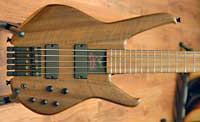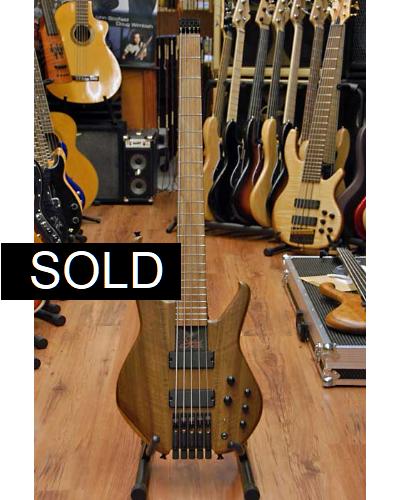Status is one of the true pioneers in the bass industry, having incorporated design and construction innovations such as the use of graphite and headless designs as early as the beginning of the 80's.
More than 25 years after, Rob Green is still creating wonderful basses which feature ground breaking ideas and incorporate clever design solutions. Through all these years, Status have created a large number of different basses, from 100% graphite instruments to more traditional wooden basses, but always with some special specs. These days you can find 4, 5 and 6 string basses in the Status catalogue, and you have a choice of fretted or fretless, headless or headed, plus different boody shapes and pickup/electronics otions to suit a lot of styles.
Why graphite? this is a composite material that was first used for aircraft design and later to everyday products, always proving excellent results in situations were high performance was needed. Electric basses have always suffered from neck problems, and graphite seemed to be a good alternative to wood in this respect. Undesirable effects such as neck warping and dead spots are eliminated when a neck is made of graphite. Although wood is still mainly used in bass building these days, graphite has found it's way into many highly revered "old fashioned basses" such as Fender in the form of strips that are built into the wooden necks to prevent the neck from excessive neck movement and dead spots.
One of the characteristics of graphite is that it tends to balance all the notes and strings in terms of volume, so you get an instrument that will respond perfectly to your playing regardless the fret or string you are playing or fretting.
Another advantage of graphite is that is much more stable than wood and moves less with climate or humidity changes. This makes Status basses an excellent choice for the touring bassist that is travelling constantly and playing in different areas all the time.
All Status basses come with a two way truss rod. Even if you don't have to use the truss rod to correct the neck's curvature, you can use it to adjust the instrument's playability and adapt it to your playing technique.
At Doctorbass.net we always have several of these great basses in stock.
STATUS S2 Classic headless 5

The bass you see here is the S2 Classic, and is a reissue of the original and successful Status angular body design. This shape has proven to be very comfortable no matter if you play seated or standing.
The body is made from walnut, and the top is a spectacular piece of curly walnut.
The neck has a standard 34" scale and 24 frets, so it is very easy to play. No need to worry about the low B: it is as solid and loud as they get. If you've necer played a graphite neck, first impression is a bit cold, but Status really know how to make their necks, and it seems to meld under your hand. This is what is called "easy to play" in the true sense.
Two Status humbuckers put out a very clear and defined tone. They are conrolled by a 3 band EQ, with boost/cut Bass & Treble, and selectable mid prequency (with a cut/flat/boost switch). The 18 Volt power supply from two batteries ensures extra headroom.
The mono rail bridge further aids to the idea of maximum definition and note separation. There's not a single technique you cannot use in the bass, and you always get amazing results.
Of course, slap sounds full, fast and clear. Switching to fingerstyle does not require any change in the controls, and you get a solid growl that is just addictive. Even using a pick with the front pickups yields a wonderful sound that reminds of a classic Precision, except with extra detail and warmth. Tapping is also remarkably clear, with that sought after piano like attack.
The bas's fretboard is made of phenowood: thin laminates of wood are pressed and heated and treated just like phenolic fretboards. The result is a neck with all the strenght and durability of phenolic, but with a nice touch of wood. Plugged to an amp this bass may sound a little colder than an all wood bass, but when you use it live you'll understand why so many sound engineers love Status basses: it is really easy to mix this bass and make it cut through a wall of guitars, keyboards and horns.
The bass comes with 35-115 strings. Of course you can use whatever gauge you like, but before you change them, give them a chance; you may be surprised how well Status basses sound and play with light strings. Such gauge in a Fender style bass would produce a thin sound, but in this case you get a full sound, and a very wasy to play bass thanks to the low tension of the thin gauge.
You may or not like the headless design, but is has a couple of advantages: you can carry it around in a guitar's gigbag, and also tuning is more stable than headed systems. If you've ever heard that headless basses suffer from lack of sustain, all you have to do is pluck a string in this bass and start counting!!




